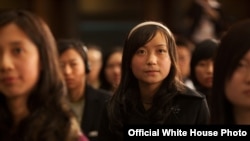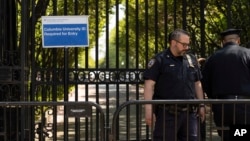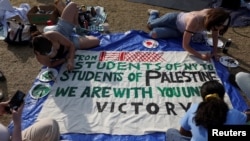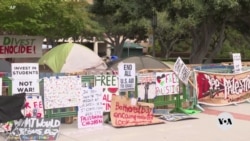Student Union
Chinese Students Say Free Speech in US Chilled by China

Although Beijing is thousands of miles away, some Chinese students and China-studies professors in the U.S. say they fear the Communist Party is reaching into their classrooms.
Interviewed at a half-dozen U.S. universities, students from the People's Republic of China (PRC) reported self-censoring in class on topics deemed sensitive by the Communist Party -- such as the massive protests in Hong Kong and the status of Taiwan..
"I wouldn't feel safe to speak publicly or under recording," said a PRC graduate student at Georgetown University in Washington.
Chinese students said they were concerned about being watched by fellow Chinese students. One student said he feared it would negatively impact his family back in China, his future, and his visa.
"For me, I will go back to China and get a job," the student said. "Maybe, I will work for a government corporation. So, if I say something sensitive about Hong Kong, I worry that the Chinese government will know something about my opinion and that will influence my work or my future in China."
The PRC embassy in Washington did not return VOA's request for comment.
Students interviewed for this story said they feared retribution from the Chinese government if they were identified.
"In China, we don't want to talk about the government too much," said one University of Maryland student. "I send Twitter news to my friends in China but later delete the information from my phone, because I am afraid that when I get back to China, they will search my phone."
The student noted that his political-science undergraduate research is hindered by his discomfort speaking on certain class topics: mass protests in Hong Kong, the independent status of Tibet and Taiwan and recognition of the Dalai Lama, the Tibetan spiritual leader.
The Wilson Center, a bipartisan think tank in Washington, reported in 2017 that a small community of PRC students and diplomats have engaged in intimidation tactics ranging from intelligence gathering to financial retaliation. "A Preliminary Study of PRC Political Influence and Interference Activities in American Higher Education" examines PRC influence in American universities.
Western college professors say they, too, feel Chinese intelligence gathering in their classrooms.
"There have been a couple times where I have had these older gentlemen from the PRC show up in my classroom unannounced and claim they were visiting and who wanted to sit in on my class," said Crystal Chang-Cohen, who teaches political science at University of California-Berkeley. "But they could not produce any ID so I said no."
Professors who research Chinese politics and history said they suspect they are monitored by PRC intelligence officials. One instructor said Chinese who attend his class who appear older than a typical student are asked to leave if they decline to produce student identification.
A University of Maryland history professor said he, too, occasionally sees classroom visitors he does not recognize. He said he suspects they are gathering intelligence.
"I think it is a concern that we have organizations on campus that have significant ties to the Chinese government, and are used to monitor the behavior of my PRC students," said a government and politics professor at the University of Maryland. Classroom discussions "are typically dealing with PRC sensitive issues, for example, history or political science," the professor said.
Almost all of the college instructors and professors interviewed by VOA asked to remain unnamed out of fear their American universities would not support them if the Chinese government protested their comments, they said.
Chinese students comprise more than 33% of the 1,095,299 international students in the U.S. They typically pay full tuition and fees, which many U.S. universities rely upon for revenue.
The PRC has slashed lucrative university programs when the program dissented from the Chinese government's policies, the Wilson Center reported. It retaliated against the University of Maryland in 2013, which hosted the exiled spiritual leader of Tibet, the Dalai Lama, despite warnings from Chinese diplomats. China has occupied Tibet for more than 60 years.
In 2018, Vice President Mike Pence described China's funding for the Maryland program as "suddenly turned from a flood to a trickle."
Chinese Students and Scholars Associations (CSSA) "alert Chinese consulates and embassies when Chinese students, and American schools, stray from the Communist Party line," Pence said at an address at the Hudson Institute in Washington.
And Chinese student Yang Shuping, who addressed the 2017 graduation exercises at the University of Maryland about the "fresh air of free speech" in America, was swiftly rebuked back home. The Communist Party's official newspaper -- China Daily -- published her family's address in China and the family was roundly harassed online.
Shuping later apologized.
Professors and students point to campus Confucius Institutes and CSSAs as participants in intelligence gathering and political influence. The Chinese government, which funds Confucius Institutes worldwide, says these organizations disperse information about Chinese culture and society, not political dogma.
The Confucius Institute U.S. Center describes itself as supporting "the teaching and learning of Chinese language and culture in the United States and enable people-to-people exchanges, deepening cross-cultural understanding and language development. The Center promotes a nationwide network of Confucius Institutes that delivers educational and cultural programs that teach Mandarin, cultivate Chinese cultural awareness, and facilitate educational exchanges.
"The world is a big place. The CIUS Center brings a little piece of China to everything we do.
But some universities in Australia, U.K., and U.S. have terminated their contracts with Confucius Centers after bipartisan calls for internal investigations.
Chinese influence has been a top concern of U.S. intelligence agencies.
FBI Director Christopher Wray, in testimony before Congress, said his agency has "a thousand open investigations … involving attempted theft of intellectual property," and almost all the cases involved the Chinese.
"Confucius Institutes function as an arm of the Chinese state and are allowed to ignore academic freedom," the American Association of University Professors published in 2014.
But the Association of American Colleges and Universities (AAC&U) disagrees.
"We do support the type of work done by Confucius Institutes in terms of building libraries, funding Chinese language classes and promoting cultural exchanges," said Lynn Pasquerella, AAC&U's president. "Our experience has not uncovered any evidence of interference by the Chinese government or infringements on academic freedom.
"China is our greatest collaborator for scientific research, and over-surveillance will have a negative impact on knowledge generation.
VOA reached out to six CSSAs through email and social media messages, which did not respond.
Georgetown University's CSSA mission statement describes itself as committed to "providing academic, professional, social and entertainment information and services to its members; promoting Chinese culture, history and languages; promoting dialogue within the Association and the broader Georgetown University community." Mission statements are similar at other universities with Confucius Institute contracts.
The CSSAs "receive guidance from the Chinese Communist Party through Chinese embassies and consulates … and are active in carrying out overseas Chinese work consistent with Beijing's United Front strategy," according to a 2018 report by the U.S.-China Economic and Security Review Commission. That commission monitors and investigates national and trade issues, according to its webpage.
See all News Updates of the Day
- By VOA News
US is now the most desirable country for international students

That’s according to this year’s Emerging Futures research survey, from education consultant IDP Connect. Other Western countries have slipped due to new visa restrictions and caps on international students. Read a summary of the research from ICEF Monitor. (April 30, 2024)
Pro-Palestinian protesters break through barricades to retake MIT encampment

Pro-Palestinian protesters who had been blocked by police from accessing an encampment at the Massachusetts Institute of Technology on Monday broke through fencing, linked arms and encircled tents that remained there, as Columbia University canceled its university-wide commencement ceremony following weeks of pro-Palestinian protests.
Sam Ihns, a graduate student at MIT studying mechanical engineering and a member of MIT Jews for a Ceasefire, said the group has been at the encampment for the past two weeks and that they were calling for an end to the killing of thousands of people in Gaza.
"Specifically, our encampment is protesting MIT's direct research ties to the Israeli Ministry of Defense," he said.
Protesters also sat in the middle of Massachusetts Avenue, blocking the street during rush hour in the Boston area.
The demonstrations at Columbia have roiled its campus and officials said Monday that while it won't hold it's main ceremony, students will be able to celebrate at a series of smaller, school-based ceremonies this week and next.
The decision comes as universities around the country wrangle with how to handle commencements for students whose high school graduations were derailed by COVID-19 in 2020. Another campus shaken by protests, Emory University, announced Monday that it would move its commencement from its Atlanta campus to a suburban arena. Others, including the University of Michigan, Indiana University and Northeastern, have pulled off ceremonies with few disruptions.
Columbia's decision to cancel its main ceremonies scheduled for May 15 saves its president, Minouche Shafik, from having to deliver a commencement address in the same part of campus where police dismantled a protest encampment last week. The Ivy League school in upper Manhattan said it made the decision after discussions with students.
"Our students emphasized that these smaller-scale, school-based celebrations are most meaningful to them and their families," officials said.
Most of the ceremonies that had been scheduled for the south lawn of the main campus, where encampments were taken down last week, will take place about 8 kilometers (5 miles) north at Columbia's sports complex, officials said.
Speakers at some of Columbia's still-scheduled graduation ceremonies include Pulitzer Prize-winning playwright James Ijames and Dr. Monica Bertagnolli, director of the National Institutes of Health.
Columbia had already canceled in-person classes. More than 200 pro-Palestinian demonstrators who had camped out on Columbia's green or occupied an academic building were arrested in recent weeks.
Similar encampments sprouted up elsewhere as universities struggled with where to draw the line between allowing free expression while maintaining safe and inclusive campuses.
The University of Southern California earlier canceled its main graduation ceremony. Students abandoned their camp at USC on Sunday after being surrounded by police and threatened with arrest.
Other universities have held graduation ceremonies with beefed-up security. The University of Michigan's ceremony was interrupted by chanting a few times Saturday. In Boston on Sunday, some students waved small Palestinian or Israeli flags at Northeastern University's commencement in Fenway Park.
Emory's ceremonies scheduled for May 13 will be held at the GasSouth Arena and Convocation Center in Duluth, almost 20 miles (30 kilometers) northeast of the university's Atlanta campus, President Gregory Fenves said in an open letter.
"Please know that this decision was not taken lightly," Fenves wrote. "It was made in close consultation with the Emory Police Department, security advisors and other agencies — each of which advised against holding commencement events on our campuses."
The 16,000-student university is one of many that has seen repeated protests stemming from the conflict that started Oct. 7 when Hamas militants attacked southern Israel, killing about 1,200 people, mostly civilians, and taking roughly 250 hostages. Student protesters are calling on their schools to divest from companies that do business with Israel or otherwise contribute to the war effort.
Vowing to destroy Hamas, Israel launched an offensive in Gaza that has killed more than 34,500 Palestinians, about two-thirds of them women and children, according to the Health Ministry in the Hamas-ruled territory. Israeli strikes have devastated the enclave and displaced most of its inhabitants.
Hamas on Monday announced its acceptance of an Egyptian-Qatari cease-fire proposal, but Israel said the deal did not meet its "core demands" and that it was pushing ahead with an assault on the southern Gaza town of Rafah.
"Cease-fires are temporary," said Selina Al-Shihabi, a Georgetown University sophomore who was taking part in a protest at George Washington. "There can be a cease-fire, but the U.S. government will continue to arm the Israeli military. We plan to be here until the university divests or until they drag us out of here."
At the University of California, San Diego, police cleared an encampment and arrested more than 64 people, including 40 students.
The University of California, Los Angeles, moved all classes online for the entire week due to ongoing disruptions following the dismantling of an encampment last week. The university police force reported 44 arrests but there were no specific details, UCLA spokesperson Eddie North-Hager said in an email to The Associated Press.
Schools are trying various tactics from appeasement to threats of disciplinary action to get protestors to take down encampments or move to campus areas where demonstrations would be less intrusive.
The School of the Art Institute of Chicago said in a Facebook post Sunday that it offered protesters "amnesty from academic sanction and trespassing charges" if they moved.
"Many protesters left the premises of their own accord after being notified by the police that they were trespassing and subject to arrest," the school said. "Those that remained were arrested after multiple warnings to leave, including some of whom we recognized as SAIC students."
A group of faculty and staff members at University of North Carolina at Chapel Hill asked the administration for amnesty for any students who were arrested and suspended during recent protests. UNC Faculty and Staff for Justice in Palestine said in a media advisory that it would deliver a letter on behalf of more than 500 faculty who support the student activists.
Other universities took a different approach.
Harvard University's interim president, Alan Garber, warned students that those participating in a pro-Palestinian encampment in Harvard Yard could face "involuntary leave." That means they would not be allowed on campus, could lose their student housing and may not be able to take exams, Garber said.
Columbia University cancels main commencement after protests that roiled campus for weeks

Columbia University is canceling its large university-wide commencement ceremony amid ongoing pro-Palestinian protests but will hold smaller school-based ceremonies this week and next, the university announced Monday.
"Based on feedback from our students, we have decided to focus attention on our Class Days and school-level graduation ceremonies, where students are honored individually alongside their peers, and to forego the university-wide ceremony that is scheduled for May 15," Columbia officials said in a statement.
The protests stem from the conflict that started Oct. 7 when Hamas militants attacked southern Israel, killing about 1,200 people, mostly civilians, and taking roughly 250 hostages. Vowing to destroy Hamas, Israel launched an offensive in Gaza that has killed more than 34,500 Palestinians, about two-thirds of them women and children, according to the Health Ministry in the Hamas-ruled territory. Israeli strikes have devastated the enclave and displaced most of its inhabitants.
The University of Southern California earlier canceled its main graduation ceremony while allowing other commencement activities to continue.
- By VOA News
Where Are Pro-Palestinian Campus Protests Happening?

Colleges in the U.S. have been rocked by a wave of campus protests calling for an end to the war in Gaza, and for U.S. colleges to divest from Israel.
The Wall Street Journal’s Steven Russolillo rounds up some of the most important ones. (April 2024)
Pro-Palestinian protests in US could impact 2024 election
Despite the fact that many of their encampments at university campuses have been dismantled, pro-Palestinian demonstrators in the United States are standing their ground. If the protests continue, some analysts say they could have an impact on the 2024 presidential election. VOA’s Veronica Balderas Iglesias explains.










